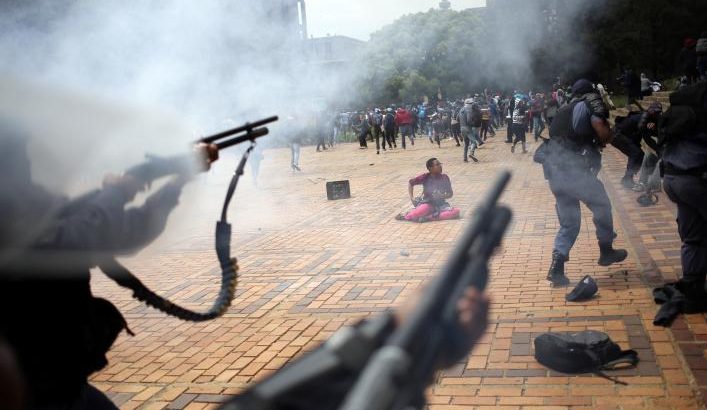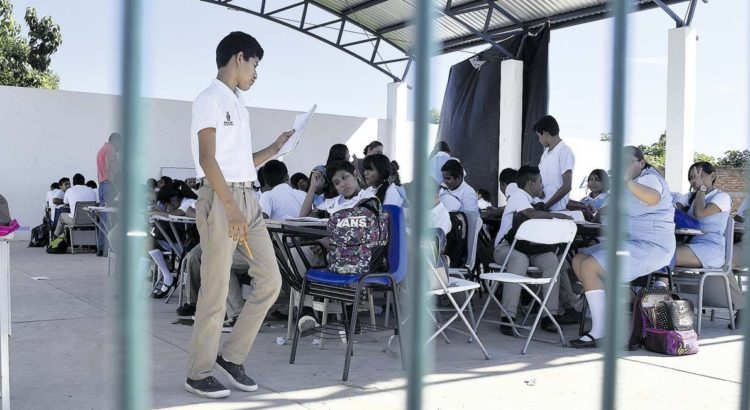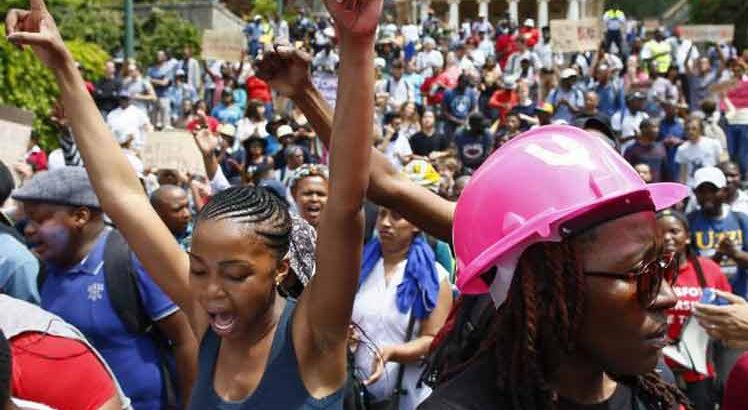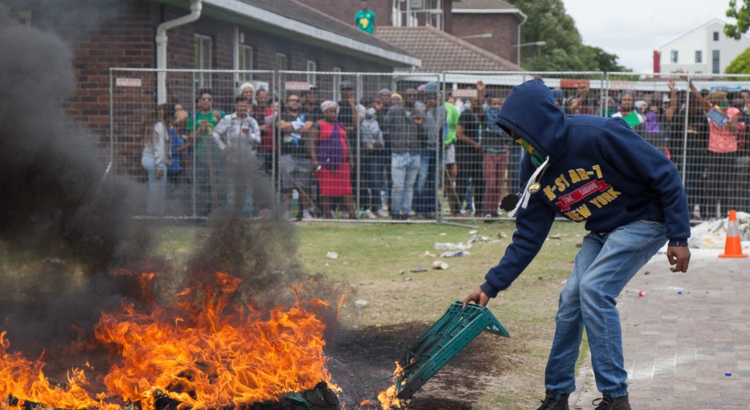África/Sudáfrica/Octubre de 2016/Autor: Jason Burke/Fuente: The Guardian
RESUMEN: Los líderes estudiantiles en Sudáfrica se han comprometido a continuar con las protestas en contra de los derechos de matrícula ya que el país se prepara para más violencia en los campus. Las universidades suspendieron las clases esta semana después de que las manifestaciones se tornaron violentas, con granadas de aturdimiento, policías que disparaban balas de goma y gases lacrimógenos a los estudiantes que arrojaban piedras. Las protestas se produjeron después el gobierno de Jacob Zuma quien dijo que no podía permitirse el lujo de educación gratuita para todos, sin embargo seguiría prestando asistencia en los costos universitarios para los estudiantes más pobres. La Universidad de Witwatersrand (Wits) en Johannesburgo tenía la esperanza de volver a abrir el lunes después de que la policía se enfrentó a principios de esta semana con los manifestantes estudiantiles en el campus.
Student leaders in South Africa have pledged to continue protests against tuition fees as the country braces for further campus violence.
Universities suspended classes this week after demonstrations turned violent, with police firing stun grenades, rubber bullets and teargas at stone-throwing students.
The protests came after Jacob Zuma’s government said it could not afford free education for all, though it would continue providing assistance for university costs for the poorest students.
The University of the Witwatersrand (Wits) in Johannesburg had hoped to reopen on Monday after police clashed earlier this week with student demonstrators on the campus. Classes are now unlikely to resume.
An extraordinary general assembly at the 120-year old-university, called in the hope of reaching agreement, was cancelled on Friday because “no consensus” existed, as well as for security reasons.
Analysis South Africa’s student protests have lessons for all universities
The uprising has specific roots in apartheid and colonialism. But issues of race, identity, fees and unemployment are provoking unrest across the world
Read more
Leaders of the student protesters said on Friday they had hoped to convince the university authorities to back their campaign to force the government to increase subsidies to further education, and had no choice but to continue the campaign. “We wanted to get the university to join us. But if we stop now it means we go back to classes having won nothing,” said Thalo Mokoena, of the Student Representative Council.
Protests have hit more than half of South Africa’s universities in recent weeks. Though most have been peaceful, there have been frequent clashes with security guards and police. Several buildings were set alight at the University of Cape Town while at the University of KwaZulu-Natal last month a library was burned.
Last year a campaign to force the government to bring down the cost of university education led to a freeze in the level of fees. This year the ministry of education has said individual universities could impose a rise of up to 8%, slightly more than the rate of annual inflation in South Africa.
Universities say they cannot make further concessions as last year’s fee freeze has put their finances under great strain. Undergraduate tuition fees at Wits, which is one of South Africa’s most expensive universities, are as high as 60,000 rand (£3,500) a year depending on the course. Accommodation, textbooks and transport are also expensive.
Such costs make further education beyond the means of many black students, who are around four times less likely to go to university than their white counterparts. Even fewer graduate.
“It’s normal for maybe a third to drop out, just because they can’t afford it. We paid our fees. But what about those who can’t?” said Tshikhudo Milalo, 21, an engineering student from Limpopo province.
Universities have become the focus of anger about broader inequalities that endure in South Africa more than two decades after the end of apartheid. South Africa remains one of the most unequal societies in the world, with new research showing 10% of the population owning at least 90–95% of all assets.
“The aftermath of apartheid has not been sufficiently dealt with. You are allowed to go around but economic marginalisation hasn’t changed much and opportunity certainly isn’t equal. It’s no way as bad as it was but there are parallels with back then,” said Mokoena, 22.
Advertisement
Commentators described the protests as “the moment of rupture, the noisy (if inevitable) breach of the South African democratic project,” comparing them to the 1968 student movements in France, or the Vietnam protests in the US.
At a meeting at Wits on Friday, student leaders pledged to continue what they called a “generational struggle” for justice. The movement, which observers say is less organised than last year’s, has highlighted a fundamental difference between young “born frees” who cannot remember life under the repressive racist apartheid system, which collapsed in the early 1990s, and their parents. “Our parents don’t understand … but they have been brainwashed,” said Rose, a 19-year-old student who did not want to give her full name for fear of repercussions from university authorities.
The row has also exposed a growing gap between young activists of the ruling African National Congress, and the elected officials of the party, famous for its role in the struggle to overthrow apartheid.
Gwede Mantashe, ANC secretary general, recently said he would shut the universities to teach protesters a lesson. “I’m not the minister of education [but] if I was, my first reaction would be to close [the universities]. For 16 months. And open them after six months, and close the residences for six months. After a year, people will know higher education will be important for their future,” he told reporters last month.
Other government officials have said education subsidies should not come at the expense of other sectors such as health and housing.
Many students do not support the protests, and very few support violence. A controversial SMS poll of students at Wits last week found that 77% of students who responded wanted the university to reopen.
Fuente: https://www.theguardian.com/world/2016/oct/07/south-africa-tuition-fee-protests-student-leaders-universities














 Users Today : 111
Users Today : 111 Total Users : 35460017
Total Users : 35460017 Views Today : 166
Views Today : 166 Total views : 3418631
Total views : 3418631